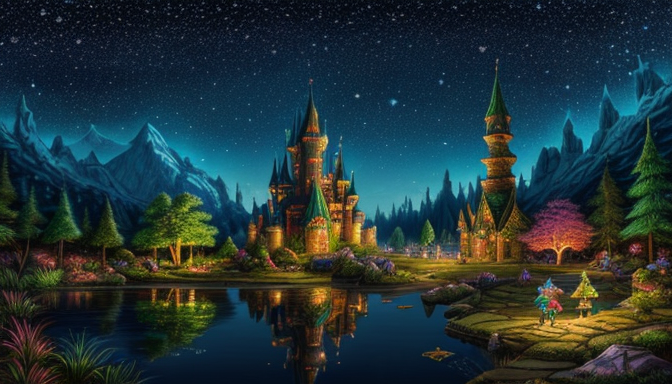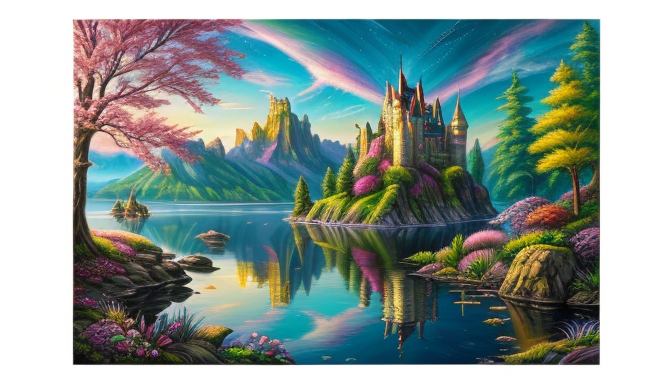The world of fantasy is not just a realm of make-believe; it’s a vibrant tapestry woven with imagination, adventure, and deep emotional connections. Iconic universes like Dungeons & Dragons, Forgotten Realms, and Warhammer captivate millions through their intricate lore and engaging world mechanics. But what is it about these fantastical settings that draws us in so irresistibly?
For many, these fantasy worlds serve as a much-needed escape from reality. They offer a chance to step away from the mundane and dive into a universe where anything is possible. In these realms, players can be heroes, wizards, or even fearsome monsters, allowing them to confront their deepest desires and fears in a safe environment. Imagine rolling dice and casting spells, where your choices can lead to epic battles or heartwarming alliances. Isn’t that thrilling?
Moreover, the rich lore behind these universes provides a cultural significance that resonates deeply with players. Each story reflects societal values and issues, serving as a mirror to our own world while allowing us to explore complex themes like friendship, betrayal, and redemption. Through imaginative storytelling, we not only get lost in the narrative but also gain insights into our own lives. It’s like looking through a magical window into our own souls.
In essence, the allure of fantasy worlds lies in their ability to transport us to places where we can be anyone and do anything. They ignite our imaginations, challenge our perceptions, and, ultimately, connect us to one another in ways that reality sometimes cannot.
The Psychological Escape of Fantasy
Fantasy worlds serve as a sanctuary for the mind, where the limitations of reality fade away, and the possibilities are as limitless as our imaginations. Think about it: when you dive into iconic universes like Dungeons & Dragons, Forgotten Realms, or Warhammer, you’re not just playing a game; you’re embarking on an adventure that allows you to explore the deepest corners of your psyche. These realms are meticulously crafted with rich lore and intricate world mechanics that invite players to not only escape but also to confront their own desires, fears, and aspirations in a way that feels both thrilling and safe.
In Dungeons & Dragons, for example, players create characters that embody their hidden selves—be it a heroic warrior or a cunning rogue. This process allows individuals to experiment with different aspects of their personality, providing a unique form of self-discovery. Similarly, the Forgotten Realms offers a tapestry of cultures and histories that reflect our own societal dynamics, allowing us to engage with complex themes such as morality, power, and sacrifice. It’s a form of storytelling that resonates on a deep emotional level, creating connections that are both personal and universal.
Moreover, the mechanics of these games often involve collaborative storytelling, where players work together to overcome challenges. This not only fosters a sense of community but also encourages teamwork and problem-solving skills—essentially turning escapism into a platform for personal growth. So, the next time you find yourself lost in a fantasy world, remember that it’s more than just an escape; it’s a journey towards understanding who you are and what you wish to become.

The Cultural Significance of Fantasy Narratives
Fantasy narratives are more than just stories; they are cultural touchstones that resonate deeply within our collective psyche. Take iconic universes like Dungeons & Dragons, Forgotten Realms, and Warhammer—each of these worlds is built on a rich tapestry of lore and intricate world mechanics that invite players and readers to immerse themselves fully. These narratives often serve as a reflection of our own societal values, grappling with themes such as heroism, morality, and the struggle between good and evil.
In Dungeons & Dragons, for example, players create characters that navigate a world filled with mythical creatures and epic quests. This not only fosters creativity but also encourages teamwork and problem-solving. The mechanics of the game allow for a unique blend of storytelling and strategy, making players feel like they are part of something much larger than themselves. Similarly, the Forgotten Realms universe is steeped in history, with detailed maps and backstories that bring its characters and settings to life, allowing fans to explore complex themes like power and betrayal.
Moreover, Warhammer offers a gritty, dystopian view of the future, tackling issues like war and survival in a way that resonates with our contemporary struggles. The interplay of different factions and their motivations provides a nuanced exploration of morality, making players question their own beliefs and choices. In essence, these fantasy worlds not only entertain but also serve as a mirror to our own culture, allowing us to explore difficult topics through the lens of imagination.
Frequently Asked Questions
- What makes fantasy worlds so appealing?
Fantasy worlds captivate us by offering an escape from reality. They allow us to explore our deepest desires and fears in a vibrant, imaginative setting. Just like a cozy blanket on a cold night, these worlds provide warmth and comfort, making us feel alive and engaged.
- How do fantasy narratives reflect our culture?
Fantasy narratives often serve as mirrors to our society, reflecting cultural values and addressing complex issues. They tackle themes like heroism, morality, and the struggle between good and evil, helping us understand ourselves and our world better, much like a storybook that teaches valuable life lessons.
- Can fantasy help with emotional well-being?
Absolutely! Engaging with fantasy can be therapeutic. It allows individuals to process emotions and confront challenges in a safe space. Think of it as a mental playground where you can swing through your fears and slide into your dreams.
- Why do people connect so deeply with fantasy characters?
Characters in fantasy often embody traits we aspire to or struggle with ourselves. They become our companions on the journey, making us feel understood and less alone. It’s like finding a friend who gets you, even if they wield a sword or cast spells!

Recent Comments